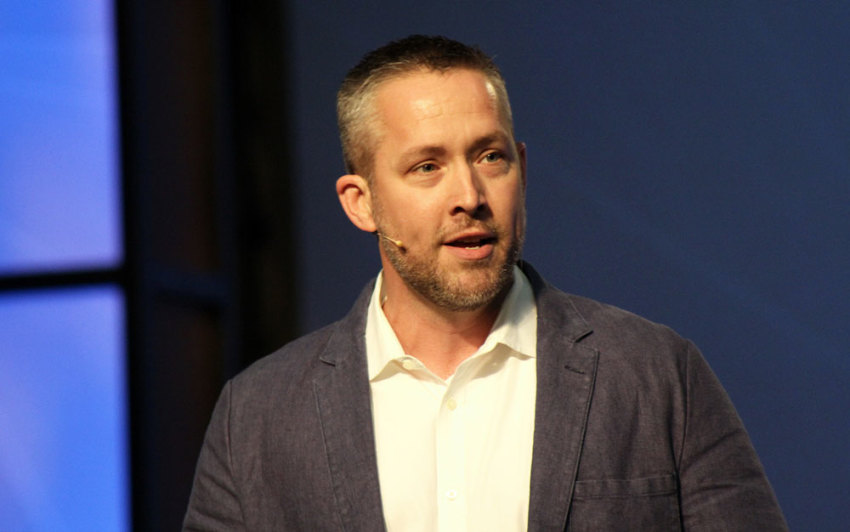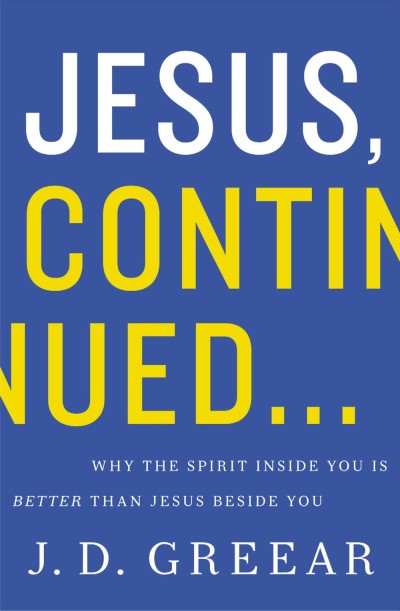NC Megachurch Pastor J.D. Greear: Holy Spirit Not Confined to Early Church but Not as 'Sensational,' Superstitious as Some Christians Claim (Video Interview)

Editor's Note: An earlier version of this article mischaracterized cessationists' belief in the working of the Holy Spirit in today's Christians. CP editors apologize for the overly broad description of the cessationist position.

North Carolina megachurch pastor J.D. Greear, author of the new book Jesus Continued, is concerned that some Christians are too confining in their view of the outward expressions of the Holy Spirit in action today. The Summit Church Raleigh-Durham pastor believes God's spirit can still be experienced in ways similar to the Apostles' encounters in the book of Acts.
Greear told The Christian Post that while he understands that the Apostles were "different" from the believers of today in that God gave them the authority to write the New Testament Scriptures and to build up the early Church, "You cannot convince me that the only book that God gave us with stories of people walking with the Holy Spirit and pursuing the Great Commission – the book of Acts – is filled with stories that have nothing in common with our experience; I just can't see that."
To those who would believe that the Holy Spirit working in the early Church is substantively different that in today's Christ followers, Greear poses "Amazing Grace" hymn writer John Newton's question: "Is it possible that which was that was so essential to the life of the Church and the believer in the first century has become irrelevant to us today?"
The Southern Baptist pastor said he believes the answer to this question is no. "God wants to relate to us in ways that are very similar to how he related to the people in Acts," Greear told CP.
However, he also disagrees with those who would try to characterize encounters with the spirit in ways he described as "sensational" or "superstition."
"The way the Holy Spirit manifests itself to us is in and through the Gospel," he explained. "This is one of the biggest surprises I had as I got into this [book] was how many places the Apostle Paul equates going deep in the Gospel with coming alive in the Spirit. The best example is Ephesians 3 where Paul says when you know the height, the width, the breath and the depth of His love then we're filled with all the fullness of God. So to him, the fullness of God is coming alive in our sense of security in Christ of the Gospel."
Greear said he was led to write Jesus Continued: Why the Spirit Inside You is Better Than Jesus Beside You because of a void he felt in his relationship with Christ.
He described, "I just felt like I'd read in the Bible about the way people related to God and I'd feel this envy of like why couldn't I relate to God that way? You've got Adam and Eve walking in the garden with God every evening; you've got God leading His people through the Old Testament, speaking to them through prophets; you've got Jesus not only giving His disciples things to learn, He's guiding them, rebuking them and encouraging them specifically. Then you get to the book of Acts and you see … the Holy Spirit is dynamic and is moving and it just didn't feel like it was that way for me."
It was through his yearning for a more personal relationship with God that Greear discovered that "this is supposed to be the Holy Spirit that is supposed to be that personal presence of God."
When it comes to the Holy Spirit, many Christian leaders are broken into one of two camps: continualists who believe all the spiritual gifts endowed by the Holy Spirit on the Apostles have continued to operate throughout church history and cessationists who believe that some of the gifts of the Holy Spirit ceased with the early Church.
Greear defined the two groups' teachings this way: "You've got the people that are really sensational about the Holy Spirit is synonymous with this kind of euphoric, emotional ecstasy that will always coincide with the crash of the guitars or the pastor going on an alliterated roll at the end of the sermon or it's like the Holy Spirit's in these strange confluence of events you know like, 'oh I was praying about whether or not to ask her out and then I saw a billboard that had the same color as the color of her eyes and I knew it was God telling me to' – you know stuff like that. That was one side. Then other side where people … it's like they react to that and the Holy Spirit is a doctrine but He's not any kind of personal presence. You know it's like they relate to Him the same way that I relate to my pituitary gland. You know I know it's in there, I don't want to lose it, I know it's essential for something but I don't relate to it in any way."
In writing about the Holy Spirit, Greear has found that the truth that falls somewhere between these two groups is that "God wants His presence to be real and personal with us."
That presence, Greear said, can be felt through the Gospel as well as God's word, His will, our gifts, and the Church.
Greear hopes that his book can help bring continualists and cessationists together in their understanding of the Holy Spirit. "That's what I hope that this does: it brings these two sides together and says it's really when you seek the spirit of God in the word of God is when He becomes real, His presence becomes tangible."
http://bcove.me/hbp7lfcu


























